Matthew Dicks's Blog, page 196
June 8, 2019
Maybe some things won't change
I know that growing up is inevitable.
Clara is ten years-old, finishing her final week in elementary school, and growing like a bean. She’s growing up. I’m fine with all of that.
But I really, really hope that it doesn’t mean that she’ll stop drawing pictures like this.
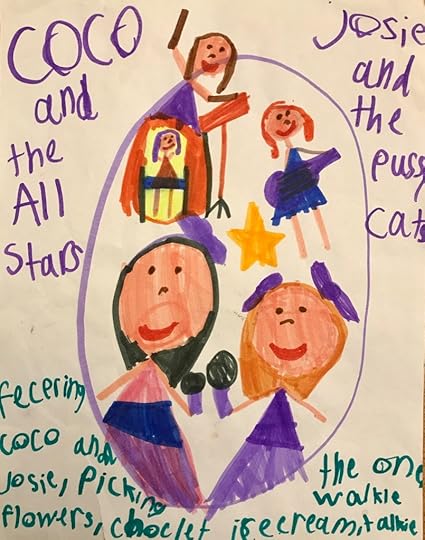
June 7, 2019
We don't know how our stuff is made.
I’ve become convinced that the people who don’t make stuff will never understand how stuff is made.
I listen to podcasts where hosts ask writers and artists about how jokes are written, screenplays are developed, and stories are crafted, and the questions they ask rarely make sense to the creators of these things.
When you’re writing a song, do you start with the rhyme at the end of the couplet or at the beginning?
Did you have that punchline first, or did you work your way to the punchline?
Did you intend the death of that character to signal the death of hope itself?
I get ridiculous questions like this, too, from readers, high school and college students, and even the occasional teacher and professor.
Just recently, a college student writing about one of my books sent me these questions:
What is the principal role of the narrative voice in your book?
In what way does the narrative voice make your work more difficult in the novel?
To what extent does the narrative voice help readers understand Max's inner world?
What was your main purpose of introducing Budo in Max's life?
What struggles did you have when framing this story?
Did you settle on metaphors and symbols before you began writing?
My answer to questions 1, 2, 3, and 5 were “I don’t understand the question.”
My answer to question 3 was, “I didn’t introduce Budo to Max’s life. He was just there.”
My answer to question 6 was, “What symbols and metaphors are in the book. I didn’t see any.”
People who don’t make stuff seem to think there is a formula for making stuff. Whether it’s fiction or comedy or art or music, folks seem to believe that we sit down with a plan. They actually think we have a formal process of some kind, complete with logic, forethought, craftsmanship, and nuance.
They don’t realize that we don’t know how our stuff is made. It’s a mystery to most of us. I’ve written fiction nonfiction, musicals, comic books, magazine essays, and poetry, and it’s always the same":
Stuff just tumbles out, probably because I’m not thinking about all the ridiculous things that these questions imply. The stuff just lands on the page or the canvas or the stage. It’s not pretty at first. It needs a lot of work. But we’re certainly not thinking in the way that teachers and professors and even the consumers of our work want to believe.
I think they want to believe that there is a formula in hopes of someday understanding the formula and then replicating it for themselves.
If only it was that easy.
In 1963, 16-year-old Bruce McAllister was sick and tired of hunting for symbols in English class, so rather than engaging in a debate with his teacher over the validity of this work, he sent a survey to 150 novelists asking if they intentionally planted symbolism in their work.
Some of my favorite responses:
Ray Bradbury: “No, I never consciously place symbolism in my writing. That would be a self-conscious exercise and self-consciousness is defeating to any creative act. Better to let the subconscious do the work for you, and get out of the way. The best symbolism is always unsuspected and natural."
John Updike: “I have no method; there is no method in writing fiction; you don’t seem to understand.”
Norman Mailer: “I’m not sure it’s a good idea for a working novelist to concern himself too much with the technical aspects of the matter. Generally, the best symbols in a novel are those you become aware of only after you finish the work.”
Jack Kerouac: “No.”
McAllister eventually became an English professor. Presumably he never asked a student to hunt for a symbol.
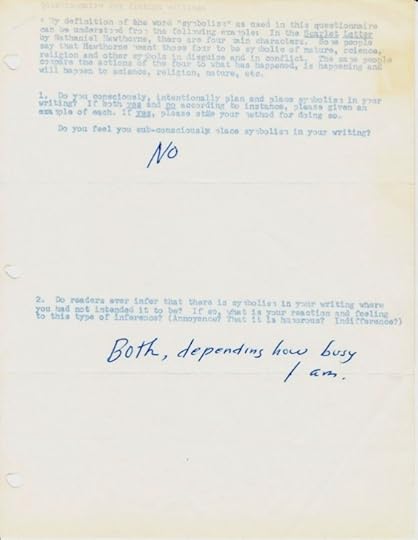
June 6, 2019
Nevers
Knowing that I have a novel coming out in November written solely in list form, a friend recently offered me her “Never List.”
It was good.
So I made my own. I encourage you to make one and share as well. _____________________________________________
Never used an illegal drug in my entire life
Never bought a lottery ticket
Never smoked a cigarette
Never tasted coffee
Never watched a single episode of The Bachelor, The Real Housewives of Wherever, or anything involving a Kardashian
Never swore in the presence of my mother
Never shoplifted
Never taken a selfie
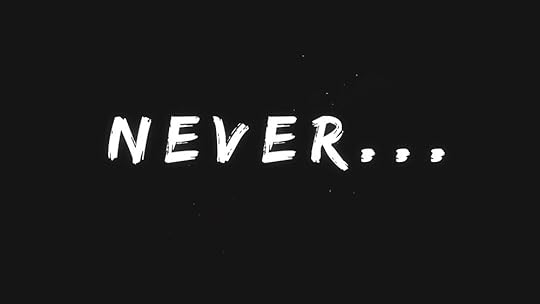
June 5, 2019
Winners get ice cream. Losers get nothing.
I was sitting at Charlie's Little League game yesterday, thinking that we might get some ice cream if the game ended early enough, when I suddenly remembered something from my childhood:
When I was playing Little League baseball, you only went for ice cream if you won the game.
As a boy, this made sense to me.
To the victor go the spoils. Winning is rewarded. Champions receive trophies.
But just imagine what might happen if the Little League coaches of today decided that only the winning team of each game would be rewarded with an ice cream cone.
I think parents might lose their minds.
I’m not sure how I feel about this.
As a boy, I know this made perfect sense to me. I remember how exciting it was to pull out of the parking lot, waving my orange cap outside an open car window, knowing that I would be devouring victory ice cream soon.
I always wanted to win the game, but the ice cream was truly the cherry on top.
And I remember losing, too. Heading home absent any frosty reward, thinking that next time, we needed to win so I could get my ice cream cone.
Winners celebrated with frosty treats. Loser got nothing.
This all made sense to me. There were no tears. No pleading. No upset feelings. I think I would’ve been embarrassed to show up at the ice cream shack if my team hadn’t won the game.
The ice cream shack was a place for winners.
But today? I don’t know.
Charlie is playing in a developmental league right now. Coaches are pitching much of the game, and instruction takes place throughout the game. Runs are scored, but the number of runs scored doesn’t matter. Even the kids aren’t keeping track yet. But assuming that Charlie continues playing next year, he will eventually find himself in baseball games where box scores are kept and winners and losers are ultimately determined.
How I would I feel if only the winning team drove off for ice cream after each game?
I’m not sure. Honestly, I think it makes sense to me, but I’m writing while Charlie is asleep in his bed. I’m not faced with a downtrodden boy and his disappointment over his team’s failure to score more runs than his opponent. I’m not battling the notion that he tried his best, so perhaps effort should be rewarded, too.
Maybe I would crack. Maybe Charlie would get ice cream, too. I’m not sure.
But here is the one thing I know for sure:
I’m glad my parents and my coaches didn’t crack. I’m glad I only received ice cream if my team won. It made the victories that much sweeter. And it made sense to me.

June 4, 2019
Check out Jared Kushner looking stupid, afraid, and bumbling.
There are a lot of takeaways from Jared Kushner’s interview with Axios:
I’m not sure if I’ve ever seen someone less prepared for an interview.
This is exactly how an interview should be conducted.
If you can’t say that birtherism wasn’t racist, then you think it was racist.
If you can’t say that Trump’s Muslim ban wasn’t religiously bigoted, then you think it was religiously bigoted.
If you can’t even say that Trump isn’t racist without tripping over your own words, then you probably think Trump is a racist.
We have a brand new definition of “deer-in-the-headlights,” and it’s Jared Kushner.
If I needed someone to defend me in a time of need, Jared Kushner would be the last person I would ever choose.
His arguments also suck.
“I wasn’t part of birtherism” is a stupid reason for refusing to say whether it was racist.
I wasn’t a part of slavery in the United States, but I can say without equivocation that it was racist.
I also wasn’t a part of Jim Crow or the Middle Passage or lynchings in the South, but yes, they were all racist, too.
I also wasn’t a part of birtherism, but yes, that was also racist, Jared.
Also, birtherism wasn’t “a long time ago.” It was less than four years ago when Trump finally acknowledged that President Obama was an American citizen. I know it feels like a long time ago given that there has been a a racist, horny, old burger goblin who literally steals children from poor people in the White House making days seem like weeks and months with his disastrous decision making, but no, four years isn’t “a long time ago.”
“You can’t not be a racist for 69 years and then run for President and be a racist” makes it clear that Kushner nothing about the Central Park Five, Trump’s lies about Muslims celebrating on rooftops on 9/11, or the FBI’s investigation in the 1970s into alleged racial discrimination in the rental of apartments from Trump's real estate company which led to requiring the Trump firm to institute a series of safeguards to make sure apartments were rented without regard to race, color, religion, sex or national origin.
Either he’s unaware or pretending not to know. Either one of these options make him look stupid and ineffective.
The best thing about this interview is how pathetic and useless it makes Kushner appear. For a boy who prides himself on his intelligence, skill, and acumen, he sounds like a bumbling, mealy-mouthed toady.
Apparently all the money in the world can’t wash away your stupidity and cowardice when the television cameras switch on and the questions begin.
June 3, 2019
Speak Up Storytelling: Aaron Wolfe
On episode #52 of the Speak Up Storytelling podcast, Matthew and Elysha Dicks talk storytelling!
In our followup segment, we shout out several dedicated listeners and discuss the benefits of dot journaling.
In our Homework for Life segment, Matt talks about how a small moment in the present can often be connected to a similar moment from the past, thus producing an excellent story.
Next we listen to a story by Aaron Wolfe.
Amongst the many things we discuss include:
The power of contrast in storytelling
Using humor seamlessly and purposefully in a story
Timing
Small endings
The use of accents in a story
An interesting way tp present previous events in a story
We then answer listener questions about titling stories, living with a storyteller, and strategies for making room for stories when you're not standing on a stage.
Finally, we each offer a recommendation.
LINKS
Purchase Storyworthy: Engage, Teach, Persuade, and Change Your Life Through the Power of Storytelling
Homework for Life: https://bit.ly/2f9ZPne
Matthew Dicks's website: http://www.matthewdicks.com
Matthew Dicks's YouTube channel:
https://www.youtube.com/matthewjohndicks
Subscribe to Matthew Dicks's weekly newsletter:
http://www.matthewdicks.com/matthewdicks-subscribe
Subscribe to the Speak Up newsletter:
http://www.matthewdicks.com/subscribe-speak-up
RECOMMEDATIONS
Elysha:
Let's Hear It For the Average Child
Matt:

June 2, 2019
Think different things. Just be nice about it.
Here’s a promise that I think every person in the world should make:
“If I love something but another person hates it and openly criticizes it, I promise not become angry and verbally or physically attack that other person because everyone gets to think different things.”
This means that when I say that I despise sushi, Donald Trump, The Police’s Roxanne, the New York Jets, mayonnaise, clothing affixed with a brand name, kugel, Ethan Frome, Dr. Pepper, gerrymandering, backing into parking spots, the mall, The Royal Tenenbaums, the billing of congregants by religious institutions, clutter, hubris, the structure of the US Senate, meetings, soccer, reality television, assault weapons in the hands of citizens, Mitch McConnell, conspicuous consumption, March, persistently negative people, conspiracy theorists, dress codes, traffic, and anything written by Virginia Wolf…
… you should not feel upset or offended or outraged or defensive because my feelings about these things have nothing to do with you. As long as my opinions don’t manifest into actions that harm the world, you should not become enraged. You should not call me infantile names. You should not threaten me with bodily harm.
Disagree. Debate. Offer reasons why I might be wrong, but don’t become angry.
Everyone gets to think different things.
You even get to think that I’m a moron. An idiot. A fool.
Just be nice about it.
To that end, I don’t even care if you’re a racist or a sexist or a bigot of any kind as long as you don’t attempt to manifest your vile and hateful opinions into structural change in our society. Think what you want as long as you don’t attempt to infringe upon the rights of others.
This is why I don’t become upset or angry when someone tells me that they hate Bruce Springsteen or the New England Patriots or Stephen King or snow days or The Matrix or President Obama or McDonald’s cheeseburgers or golf.
I might think the person is misguided or ridiculous or uninformed or lacking taste, but I don’t become angry or call that person names because we all get to think different things.
As a person who has been expressing his opinion on this blog every single day without exception since 2003 and out loud for most of his life, I can tell you that people forget this sometimes.
They forget this sometimes a lot.

June 1, 2019
Resolution update: May 2019
Each month I review the progress of my yearly goals and report on that progress as a means of holding myself accountable.
Here are the results for May.
__________________________________
1. Don’t die.
Still standing.
2. Lose 20 pounds.
I didn’t lose any pounds in May. I didn’t gain any pounds in May.
I’ve lost 8 pounds in total.
3. Eat at least three servings of fruits and/or vegetables per day, six days a week.
Done! Along with bananas, grapes, apples, and pears, I also ate carrots, onions, potatoes, and an assortment of vegetables in various soups.
4. Do at least 100 push-ups, 100 sit-ups, and 3 one-minute planks for five days a week.
Done.
5. Do burpees three days a week.
I did 3-4 burpees per day, 3 times each week in May.
Also burpees are still stupid and ridiculous. Not getting any better. This was a terrible idea.
WRITING CAREER6. Complete my seventh novel before the end of 2019.
Still waiting for a go-ahead from my editor regarding my next book. This is the problem with being two books ahead. No one is in a rush for your 2022 novel.
I’ve started writing anyway.
7. Write/complete at least five new picture books, including one with a female, non-white protagonist.
I have a fantastic new children’s book idea. I’ve started writing it.
8. Write a memoir.
Work continues. I’m worried it’s not very good.
9. Write a new screenplay.
No progress.
10. Write a musical.
No progress.
11. Submit at least five Op-Ed pieces to The New York Times for consideration.
I submitted a piece to the NY Times Modern Love column in April.
One down. Four to go.
12. Submit one or more short stories to at least three publishing outlets.
No progress.
13. Select three behaviors that I am opposed to and adopt them for one week, then write about my experiences on the blog.
No progress. Also, I need three behaviors to attempt.
Thoughts?
14. Increase my storytelling newsletter subscriber base to 3,000.
34 new subscribers in May for a total of 649 new subscribers in 2019. My list now stands at 2,759 subscribers.
If you’d like to sign up for my newsletter, you can do so here:
Subscribe
Sign up with your email address to receive news and updates.
Email Address
Sign Up
We respect your privacy.
Thank you!
15. Write at least six letters to my father.
None written in May. None written this year.
16. Write 100 letters in 2019.
Three letters written in May. Nine overall. I’ve fallen a bit behind.
17. Convert Greetings Little One into a book.
A kind, generous, and amazing human being has begun work on this project.
I am thrilled.
STORYTELLING18. Produce a total of 10 Speak Up storytelling events.
One show produced in May. We recorded Speak Up Storytelling before a live audience.
A total of 7 shows produced so far in 2019.
19. Begin selling Speak Up merchandise at our events and/or online.
Done! We began selling tee shirts and totes at our live podcast recording.
Next step is to make it available online.

20. Pitch myself to at least 5 upcoming TEDx events with the hopes of being accepted by one.
Done! I’ve pitched myself to five TEDx conferences and was nominated for a sixth.
All have now passed on my pitches. No one wants me.
I guess I’ll just keep pitching.
21. Attend at least 15 Moth events with the intention of telling a story.
I attended two Moth StorySLAMs in May, bringing my total to nine events so far.
22. Win at least three Moth StorySLAMs.
My name was not drawn from the hat at the New York City StorySLAM that I attended in May.
I finished in second place in a Moth StorySLAM in Boston. Once again by one-tenth of a point.
That is four second place finishes by a tenth of a point in a row .
Two wins so far in 2019.
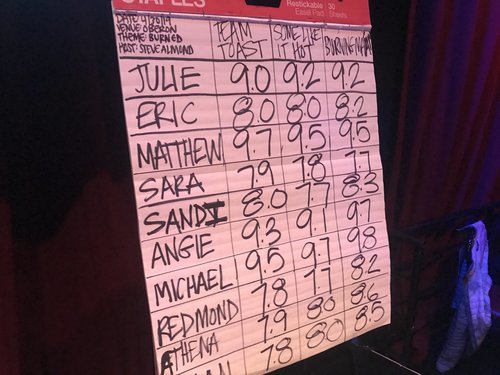
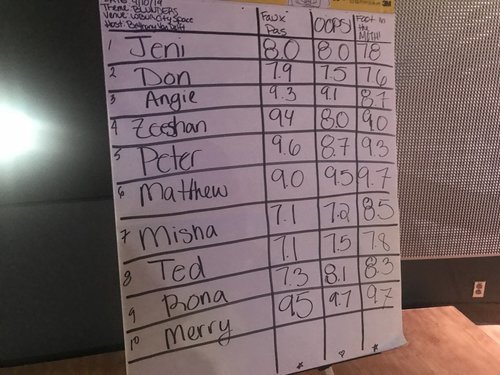
23. Win a Moth GrandSLAM.
I finished in second place by a tenth of a point in a Moth GrandSLAM in January.
I finished in fourth place in my Moth GrandSLAM in March, but I think I might’ve told my best story ever.
I’ll be competing in another Moth GrandSLAM in NYC in July.
24. Produce at least 40 episodes of our new podcast Speak Up Storytelling.
Four new shows released in May. A total of 20 so far. We haven’t missed a week in 2019.
Listen to our latest here or subscribe wherever you get your podcasts.
25. Perform stand up at least four times in 2019.
I’ve hit a bit of a snag in terms of this goal. The open mic night where I’d been performing was shut down thanks to stupid people behaving in stupid ways. I have an opportunity to perform in a local comedy showcase, which I will do, but I was in need of another open mic.
Thanks to you, dear readers, I have found a stage. I will take that stage when summer vacation begins.
26. Develop and teach a Storytelling Master Class, in which participants have an opportunity to tell at least two stories over the course of the day or tell a story and then retell it based on feedback.
Done! Scheduled for June 1. Today!
27. Pitch at least three stories to This American Life.
No progress.
28. Pitch myself to Marc Maron’s WTF podcast at least three times.
I wrote to Marc early in January, asking for him to consider me as a guest.
No response yet.
I’ve also officially requested that my publicist assist me in this endeavor.
If you know Marc Maron, or know someone who knows Marc or know someone who knows Marc’s producer or booker, please let me know. I know that Marc and I would have an amazing conversation, and it’s currently my biggest dream to get on his show.
NEW PROJECTS29. Host a fundraiser for RIP Medical Debt, which would allow us to relieve the medical debt of struggling Americans for pennies on the dollar.
No progress.
30. Complete my Eagle Scout project.
No progress.
31. Print, hang, and/or display at least 25 prints, photos, or portraits in our home.
No progress.
32. Renovate our first floor bathroom.
Final design decisions have been made. Work will commence in July/August.
33. Organize our second floor bathroom.
No progress. Summertime project.
MISCELLANEOUS34. Cook at least 12 good meals (averaging one per month) in 2019.
I made no meals in May.
Four down. Eight to go.
35. Plan a reunion of the Heavy Metal Playhouse.
No progress.
36. Ride my bike with my kids at least 25 times in 2019.
I rode my bike with Charlie one time in May for a total of five rides so far.
37. I will not comment, positively or negatively, about physical appearance of any person save my wife and children, in 2019 in an effort to reduce the focus on physical appearance in our culture overall.
Done! I did not comment on physical appearance with the exception of my wife and children in May and two other exceptions:
Crazy Hair Day: I considered this school spirit day akin to Halloween. When your student comes to school with an enormous afro woven with blinking Christmas lights, it’s okay to comment positively.
Macbeth: My students performed their annual Shakespearean play last week, and I put each of them in costume. During the costuming process, I commented positively on how they looked in order to ensure that they felt good about their costume.
38. Surprise Elysha at least six times in 2019.
Two surprises were set into motion in May, but neither has come to fruition yet.
Four surprises accomplished so far.
39. Replace the 12 ancient, energy-inefficient windows in our home with new windows that will keep the cold out and actually open in the warmer months.
No progress.
40. Clean the basement.
Incremental progress. Every week I throw away or organize a few items.
I’m planning to order a dumpster this summer.
41. Set a new personal best in golf.
I played four rounds of golf in May. I played poorly but showed flashes of promise. I actually drove the ball well for an entire round (which is to say I hit the ball straight but not terribly long).
I’ve decided to take lessons this summer on a regular basis.
42. Play poker at least six times in 2019.
A game was scheduled and canceled in May. That’s two cancelled games so far.
A new game is scheduled for June.
43. Spend at least six days with my best friend of more than 25 years.
Bengi and I spent a Sunday morning walking the track in his town back in March.
One down. Six to go. We have plans in June.
44. Post my progress in terms of these resolutions on this blog on the first day of every month.
Done.
May 31, 2019
Celebrate yourself.
Don’t forget to celebrate, people.
This year I have a novel publishing in November in the United States, and I have a different novel publishing in the UK and internationally in a couple months.
This two book oddity was the result of a change by my US publisher, St. Martin’s Press. The Other Mother was originally slated to publish in the United States in April of 2019, but when my editor heard that I was tinkering with a novel comprised entirely of lists, she asked to see it.
She didn’t want to buy the book, but she was curious what a book like this would look like.
Three days later, after having read my partial manuscript, she asked that we push The Other Mother off to 2021 and publish my book of lists, now titled Twenty-one Truths About Love, first.
Also, I had to finish the book.
I agreed, and I did. But my UK publisher, Little Brown, had already purchased The Other Mother and still wanted to publish it first.
Thus my two books in one year situation.
Yesterday, while struggling to finish a proposal for another book while working on publicity for these two books, I paused amidst my frustration and annoyance to remind myself:
You’ve published four novels and a book of nonfiction. In more than 25 countries. Your books are optioned for film. And you have two more novels coming out this year.
One of them - a book comprised entirely of lists - seemed so ridiculous that even I didn’t take it too seriously.
Yes, it’s no fun writing book proposals. Book proposals are boring and stupid. And yes, publicity is also no fun. But look what you’ve done. There was a time when publishing a single book seemed impossible. Stop complaining and celebrate where you are today.
Then I reminded myself that there was once a time when simply graduating from college and becoming an elementary school teacher seemed like an impossible dream. Even though I’ve been teaching for 20 years, I try not to lose sight of the fact that I get to live my impossible dream with my fifth graders every day.
Then I reminded myself that there was once a time when all I wanted to do was tell one story on one Moth stage. That would truly be an impossible dream come true.
And winning? That was too ridiculous to even consider a dream.
Since that fateful night in July of 2011 when I stood on my first Moth stage, I have stood on hundreds of stages around the world, including 93 Moth stages around the country, winning 39 times. Every time I take a stage anywhere in the world, I try to remind myself that I’m living my impossible dream.
Then I remind myself that there was a time when I was homeless and genuinely believed that getting a roof over my head again would be impossible. There was a time when I was sitting in a jail cell, wondering if I would ever be free of the false charges leveled against me. There was a time on a greasy tole floor of a McDonald’s restaurant, gun pressed against my head, when I thought that surviving just three more minutes would be impossible.
All impossible dreams fully realized.
There was once a time when I thought that Elysha was so far out of my league that it would be a waste of time to even try to date her. I would be damn lucky, I thought, just to be her friend.
I really believed this.
Instead, I married the woman too good for me.
Impossible dream realized. The best one. of all.
Celebrate people. Don’t lose sight of how far you have come. Don’t forget about the hurdles you have already overcome. Don’t ignore the impossible dreams that have become your everyday reality.
It would be easy for me to forget that teaching and performing and writing - things that have become an everyday part of my life - once seemed impossible. It would be easy for me to forget that a home and freedom were once insurmountable mountains to climb. It would be easy to forget looking across a room at Elysha and hoping that someday I might meet a girl almost as perfect as she was.
Instead of forgetting, I remind myself about all of these things all the time.
You should, too.
Celebrate every difficult or seemingly impossible step that you have taken. Celebrate yourself. Always be looking to the next horizon, but don’t be afraid to look back on the mountains you have already summited in order to seek that new horizon.
Honor yourself and your accomplishments, especially when things are hard. They’ve been hard before, and you survived and thrived. You’ve probably done the impossible many times in your life. You’ve done things you could only dream of doing.
You can do it again.
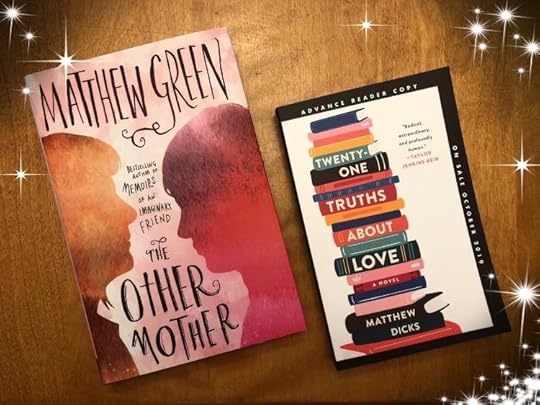
May 30, 2019
Stop complaining. It's killing you. It's killing us, too.
A friend recently sent me me a piece on the hazards of complaining.
They are extensive.
The more you complain, the more likely you are to choose negative over positive thinking in the long run. Remarkably, each time you complain your brain is actually physically rewiring itself, making it easier to adapt to that reaction in the future.
MRI scans have shown that constant complaining can lead to the shrinkage of the hippocampus, which can lead to memory decline and an inability to adapt to new situations.
The more you complain, the higher your cortisol levels, which can lead to health problems like increasing depression, insomnia, digestive problems, high blood pressure, and an increased risk of heart disease.
Constant complainers often find themselves socially isolated from colleagues, peers, and even family members.
Anecdotally, I’ll also add that constant complainers often accomplish less, create more problems, and generally suck as human beings.
But here’s my quandary:
Do constant complainers know that they are constant complainers?
I don’t think so.
Why would anyone wander through this world, purposefully but ineffectually whining and complaining about every little thing, while the people around them roll their eyes, turn their backs, and further distance themselves from their incessant negativity?
Why would anyone be so intentionally off-putting?
Right?




